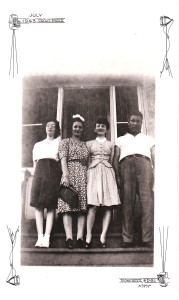When I think of my grandmother, Bub, I think of food. Potato and lox soup, boiled in an aluminum pot on the stove, soup meat stringing off marrow bones and gefilte fish made from scratch. On Gefilte Fish Day, Bub pushed slabs of raw carp through the electric meat grinder. The smell was so ripe that I had to run through the kitchen holding my breath and nose to avoid the odors. I never stayed to watch her form the wet mixture of fish and chopped carrots into mounds and cover them with a filmy gelatin. But by the time the gefilte fish was cooked and served with spoonfuls of nose-burning horseradish, it was delicious.
Bub was a small woman, no taller than five-foot-three, with thick wrists and ankles. She came to the United States in 1915 from Schrednek, a farming village in Lithuania. “We made cheese and butter and I helped out in the shop,” she told me. “I was seventeen and there was nothing for a girl to do, either to be a maid or stay home. So, I told my parents I wanted to go to America.”
She came over on the boat from Germany and lived in New York with her older sister and brother-in-law, who got her a job sewing collars in a sweat shop. “I was a greener,” she said. “I didn’t know from nothing. But if you told me one thing, how to make, how to do, I remembered.”
When the boss told her she would have to iron, she said no. “I wouldn’t do it. I wouldn’t stand and iron and have the steam and everything to go on me, and I quit.” She got a job at a union shop, sewing chiffon blouses for fifteen dollars a week.
Bub was dating a boy from the old country when she met my grandfather. “That boy was educated and I didn’t want him to be ashamed of me because I’m a greener,” she said. “And my husband was crazy about me. I felt, better I should marry a little lower, so he should look up to me, then I should look up to him.”
She married my grandfather and moved to Philadelphia and, a year later, my Uncle Joe was born. “My husband never wanted I should work,” she told me,” but I always kept a nice house.” She made curtains for all the windows and every week she bought something new for the house. “ I always got what I want,” she said. “When he said no, it was no, and a day later, I start to explain him, and I always got what I want.”
Bub and Pop had three more children over the next twelve years. My mother, born in 1930, was the youngest. I have toddler memories of the house on Jackson Street where my mother grew up. My cousins and I played grocery store with the wooden cases of ketchup and seltzer that Pop stored in the basement. I even have a picture of me, not quite three, in front of the brick-porched house, feeding a sugar cube to the milkman’s horse.
Mostly I remember the apartment on Large Street. The living room was always neat. There were no toys, just a room full of old-fashioned furniture: the red flowered couch, chairs with lion’s legs and dark walnut end tables, each with a cut glass candy dish filled with fruity hard candies from Israel. In the summers the window air conditioner never cooled the room enough to dry the backs of my legs, sticky-stuck against the plastic slipcovers.
For Passover every year, we went to Bub’s. Pop sat at the head of the dining room table and two card tables extended the other end all the way into the living room so that my aunts and uncles and cousins could fit. Halfway through the service, the table filled with bowls of chicken soup with rounded kneidels floating on top, then gefilte fish, roasted chicken, string beans, sauerkraut and potato kugel. Bub’s chair was closest to the tiny kitchen, but she was so busy bringing food and clearing plates that I don’t remember her ever sitting in it.
After Pop died, Bub lived in the apartment alone for nearly ten years. My family visited once a month and whenever we left, she tucked a five dollar bill in my hand. Sometimes, in the summer, I was there on a Tuesday, Bub’s card playing day. She and her friends sat around the dining room table playing rummy and poker for pennies. But I never understood much of what they were saying because they all spoke Yiddish.
Bub had gone to night school to learn English when she first came to America, but she didn’t understood what the teachers were saying. “The neighbor boy came over after school and I gave him a dollar to teach me the abc’s. But the phone always was ringing.” She never did learn how to read or write in English, but every week she read the Yiddish newspaper, The Foreword.
When Bub came to visit us on Long Island for a few weeks every year, we’d invite all my teachers over for her famous potato latkes. Bub would start early in the morning, peeling and hand–grating dozens of Idahoes into an oversized bowl of wet brown mush. Closer to lunch time, she’d ladle the batter into the frying pan of sizzling oil and cook them until they were brown and crisp, just this side of burnt. Some were browner than others because she’d sit down to eat a latke while it was still hot and forget she still had more cooking on the stove. She’d bring the latkes out by the plateful, spatula in hand. Even after she’d blotted the pancakes with a paper towel, they still left translucent outlines on the paper–lined serving platter. I would have already eaten a dozen latkes by the time she had fried the last batch and joined us at the table, still in her apron, beaming in the compliments.
Bub was in her late seventies when she came to live with my family in Arizona. She hated leaving the few friends she had that were still alive, and especially leaving my Uncle Joe, her favorite. My father tried to get her to go the Jewish Senior Center but Bub refused.
“My mind doesn’t work right,” she told me. “I never go into a conversation, you know why? I don’t hear good and I’m afraid maybe I’ll say the wrong thing. I don’t want people should think I’m a dummy.”
Bub spent most of the day in the kitchen, cooking, and her fingers were always greasy. Greasy from pulling the pin feathers off the kosher chicken with a paring knife against her thumb. Greasy from rolling ground beef, eggs and matzoh meal into walnut-sized meatballs. Greasy from skimming the fat off of yesterday’s chicken soup. My mother followed behind, wiping the trail of fingerprints that Bub left on the cabinets and refrigerator door.
Some days, when her hands hurt too much, I helped her get dressed. I was always a little embarrassed as she stood in her room in her underwear, her breasts filling only the bottoms of the white cotton cups of her brassiere. She held her pink corset with the long metal stays against her body as I methodically laced the strings through the dozen metal eyelets.
Often she would tell and retell stories of shopping for coats on South Street, my mother’s wedding, the summers she spent at Atlantic City. “I remember everything, but now, from one thing to another, I’m a dummy,” she’d say to me, dabbing her rheumy gray-green eyes with a Kleenex that she kept tucked in her brassiere.
I interviewed Bub for a women’s studies class when I was in college. I was uncomfortable asking her questions about birth control and sex, but she was willing. She said it was the man’s responsibility to prevent pregnancy. She told me that, after my mother was born, she had an abortion.
Abortion was illegal then, except for medical reasons. “The doctor told me I couldn’t have another child on account of my heart. Six doctors examined me to make sure I should be allowed to have the operation.” She was in the hospital for ten days, and when she came home she started hemorrhaging.
“It was Sunday and I was in the kitchen making chicken and I felt a gush to the floor.” The doctor came and packed her up with gauze and gave her medicine so she wouldn’t fall asleep. “I was bleeding so much if I fell asleep, I could bleed to death,” she said. “Then, twelve o’clock midnight the bed got wet again. The doctor came right over and he explained me everything.” She had been in the second trimester of the pregnancy and they hadn’t gotten everything out. “Now,” the doctor told her, “You’ll be alright.”
On my visits home from college to my parents’ house, Bub asked me to clean her earrings for her. She had a special toothbrush that I dipped in rubbing alcohol. I brushed the white-gold posts and polished the edges of the half-carat diamonds that her children had given her for her 50th wedding anniversary. Then, with a cotton ball, I swabbed the stretched out holes in her earlobes.
One afternoon after I cleaned the earrings, she handed them to me. “I want you should have them.” I didn’t want to insult her, but wearing big diamonds was hardly my style. Still, I put them in my ears, not knowing what else to do with them and I’ve worn them ever since.
Then Bub had a stroke. She wandered the house in the middle of the night. She often left the burner lit on the stove. My mother changed her diapers and spoon fed her in bed.
The last time I saw Bub was the first night of Rosh Hashana. She lay in her bed, mouth agape, oblivious to who I was. That night at the synagogue, while everyone prayed to be inscribed in the Book of Life for another year, I begged God to let my grandmother die. Two days later, she died at home in her bed. My mother held a mirror under her nose to make sure she wasn’t breathing.
Almost thirty years later I realize that, for all the cooking that Bub did, she never passed on her recipes. Nobody knows exactly how much matzoh meal she put in her latkes or how much sugar went into her chicken fricassee. And no one in my family makes gefilte fish from scratch.
But she did tell me her stories. And when I replay the tapes, it’s as if we are still sitting together in my parents’ kitchen, her stockings a little saggy around her swollen ankles. I see her blue leather shoes with the small square heel and the bulge on the sides where her bunions protrude. I see her wrinkled cheeks and I remember how soft her face was when she pressed it to me in a goodbye kiss.


This was so lovely!!!
So glad you enjoyed it!